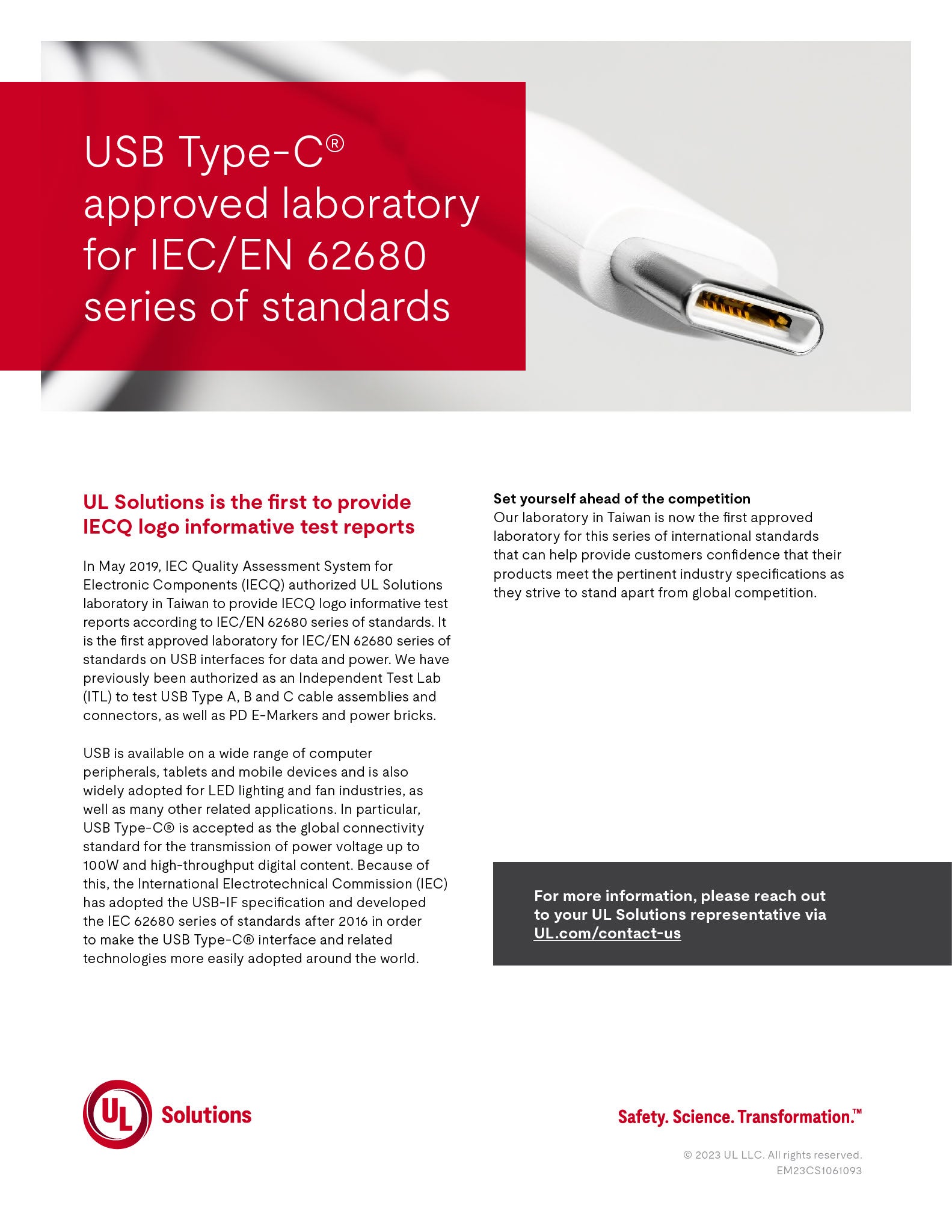The importance of USB-IF product certification
A wide variety of devices now rely on USB Type-C for connection, communication and power. The industry needs the ability to distinguish compliant USB cables, devices or chargers from non-compliant ones.
UL Solutions is authorized by USB Implementers Forum Inc. (USB-IF) as an Independent Test Lab (ITL). UL Solutions, certified by USB Implementers Forum Inc. (USB-IF), can help your confidence — whether you are a brand owner, installer, retailer or end user — about the reliability of the data transmission rate, the cable and connector design, and the implementation of USB power delivery (PD).
With a view to address these concerns, we join the efforts of USB-IF to help assess USB product compliance through the testing of USB Type-C cable assemblies, connectors, PD chipsets and power bricks for USB-IF certification.
Download our sell sheet
Learn more about our turnkey solutions for interoperability testing challenges.
EU Radio Equipment Directive amendment
The release of Directive (EU) 2022/2380 amends the Radio Equipment Directive (RED) and adds a new set of essential requirements in a new section of the RED, Article 3.4. The article refers to the EN IEC 62680-1-2 and EN IEC 62680-1-3 standards.
Article 3.4 creates essential requirements for a common charger interface for most portable consumer electronics equipment, including mobile phones, tablets, digital cameras, headphones, headsets, handheld videogame consoles, portable speakers, e-readers, keyboards, mice, earbuds, portable navigation devices and laptops.
The EU has adopted USB Type-C as a common interface, and devices within the scope of these requirements will need to use the USB Type-C charger. The new rules will make it mandatory to use a USB Type-C interface for the wired charging port in the above-affected devices, which means that the same type of charger can charge these devices. This will improve consumer convenience by harmonizing the charging interface and fast charging technology, and it is expected to significantly reduce electronic waste.
Testing to USB-IF specification and IEC 62680
USB-IF has authorized our laboratory in Taiwan as an ITL with broad scope coverage. We can support testing to the following compliance specifications:
- USB 2.0
- USB 3.2
- USB 4®
- USB Type-C® and
- USB PD compliance specifications.
In addition to USB-IF product certification testing, UL Solutions’ Taiwan laboratory has achieved International Electrotechnical Commission Quality Assessment System (IECQ) Independent Testing Laboratory status to offer testing services to the IEC 62680 series of standards for universal serial bus interfaces for data and power.
Our laboratory in Dongguan has also been authorized as a USB-IF ITL to provide testing services to USB PD compliance specifications.
Quick turnaround from qualified USB-IF experts
You need your project turned around quickly, and you need it done in a cost-efficient manner. We understand that. That is why we strive to help meet your schedule and requirements.
To help overcome challenges in USB-IF related product development and production, we have the resources to provide problem analysis and technical advisory from certified test engineers and technical experts.
Comprehensive submission process for USB-IF and safety certification
Our safety certification programs for various high-speed data connectivity technologies may be done in addition to the USB-IF certification testing service to evaluate if the products in question meet the pertinent industry specifications. The launch of extended power range (EPR) in the USB PD specification allows USB Type-C ports to support up to 240W of power. This creates a higher safety concern that developers must address when developing products adopting the EPR feature.
USB4® and USB Type-C® are registered trademarks of USB Implementers Forum.
Get in touch
Let us know how we can help.












